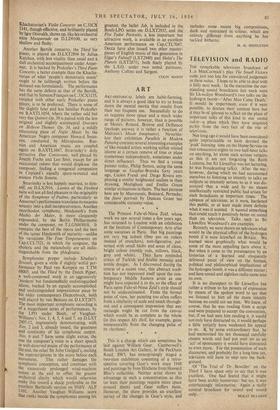TELEVISION and RADIO
THE remarkable television broadcast of I MacCormick's play The Small Victory came just too late for considered judgement in these notes. I hope to be able to deal with it fully next week. In the meantime the out- standing sound broadcasts last week were Sir Llewellyn Woodward's two talks on the hydrogen bomb—`After Man Came Death.' It would be impertinent, even if it were possible, to discuss their content here but it may be of i,nterest to reflect on the place of important talks of this kind in our sound rad.o—a place which they have acquired partly from the very fact of the rise of television.
Not long ago it would have been considered, quite impracticable to have devoted the 'peak' listening time on the Home-Service on two consecutive nights to two half-hour talks on anything, let alone such serious subjects as this (I am not forgetting the Reith Lectures, but Sir Llewellyn was not lecturing, he was broadcasting talks). After the war, however, during which we had accustomed ourselves to listening so intently to talks on subjects so intensely serious to us it was dis- covered that a wide and by no means intellectually restricted public had arisen for such broadcasts at important times. The advance of television, as it were, hardened this public, or at least made more definite what it was it wanted. It wanted something that could reach it positively better on sound than on television. Talks such as Sir Llewellyn Woodward's are examples.
Recently we were shown on television what would be the physical effect of the hydrogen bomb if it were launched on Britain. We learned most graphically what would be some of the most appalling facts about it. But when it came to the presentation by an historian of a learned and eloquently delivered point of view on the human, political and philosophical implications of the hydrogen bomb, it was a different matter; and here sound and sightless radio came into its own.
It is no disrespect to Sir Llewellyn but rather a tribute to his powers of expression by means of the spoken word to say that we listened to him all the more intently because we could not see him. We knew, of course, that he was reading from a script and were prepared to accept the convention, but, if we had seen him reading it, it would not only have distracted us, it would perhaps a little unfairly have weakened his appeal to us. If, by some extraordinary feat, he had memorised his ten thousand carefully chosen words and had put over on us an 'act' of spontaneity it would have distracted as even more. For the presentation of such discourses, and probably for a long time yet, television will have to step into the back- ground.
Of 'The Trial of Dr. Bowdler' on the Third I have space only to say that it was excellent. One had feared that it might have been archly humorous: but no, it was entertainingly informative. Again a really natural broadcast for sound and sound


































 Previous page
Previous page